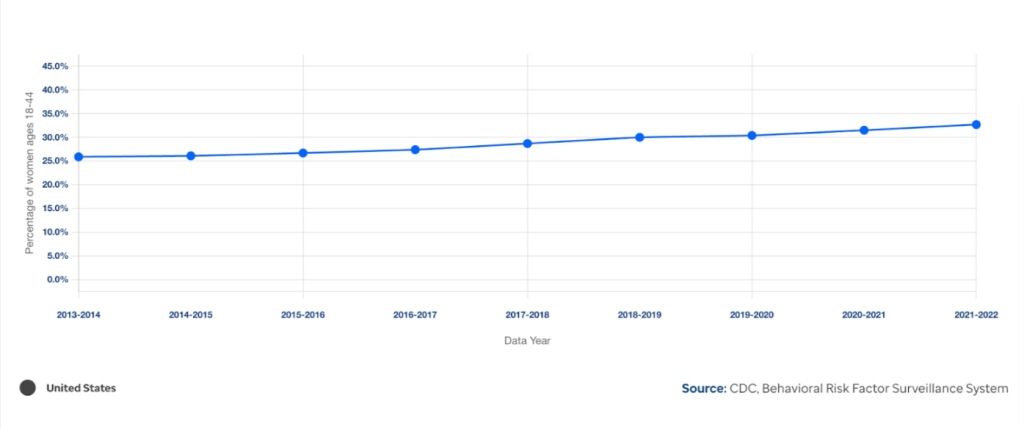Female Obesity: Why Are Females More Prone to Obesity?
Obesity is a major health issue in the U.S., and women are disproportionately affected. According to the CDC, 41.9% of women in the U.S. are obese, compared to 38.7% of men. But why are females more prone to obesity? The reasons are complex and involve biological, psychological, societal, and lifestyle factors.
In this article, we’ll explore these causes in detail and discuss the best weight loss solutions, including why bariatric surgery is a life-changing option for many women.
Understanding Obesity
Obesity is defined by a Body Mass Index (BMI) of 30 or higher. It happens when a person consumes more calories than their body burns over time.
Obesity isn’t just about overeating or lack of exercise. It’s a complex condition influenced by genetics, hormones, environment, and lifestyle. While both men and women face obesity risks, research shows that women store fat more efficiently, making it harder for them to lose weight.
Research shows that women’s bodies store fat more efficiently than men’s, making it harder for them to lose weight. This is partly due to hormonal differences and biological factors like pregnancy and menopause.
For example, a study published by Current Opinion in Clinical Nutrition and Metabolic Care found that women tend to store fat in their hips and thighs, which is harder to lose compared to abdominal fat commonly seen in men. This makes weight loss more challenging for women, even with diet and exercise.
Global and U.S. Obesity Rates in Women
Obesity is a global health crisis, and women are disproportionately affected. According to the World Health Organization (WHO), more than 40% of women worldwide are overweight or obese. This trend is particularly concerning because obesity increases the risk of serious health conditions like heart disease, diabetes, and certain cancers.

In the United States, the situation is even more alarming. As per the data (shown above) from CDC, Behavioral Risk Factor Surveillance System, female obesity rates have risen from 25.9% in 2013-14 to 32.7% in 2021-22. This rise is linked to factors like sedentary lifestyles, poor dietary habits, and hormonal changes.
Why Are Women More Prone to Obesity?
1. Biological and Hormonal Factors
Women’s bodies are uniquely designed, and these differences can make weight management more challenging.
Hormonal Changes
- Estrogen and Fat Storage: Estrogen, a key female hormone, influences where fat is stored in the body. During menopause, estrogen levels drop, leading to increased fat storage around the abdomen. Studies show that menopausal women gain an average of 1.5 pounds per year.
- Pregnancy: Weight gain during pregnancy can be difficult to lose postpartum. Research from Obstetrics and Gynecology found that 1 in 4 women retain 10+ pounds of pregnancy weight a year after giving birth.
Metabolism
- Women naturally burn fewer calories than men because they have less muscle mass. On average, women burn 5-10% fewer calories at rest.
2. Psychological and Emotional Factors
Women often face unique emotional challenges that can lead to weight gain.
Stress and Emotional Eating
- Women are more likely to turn to food for comfort during stressful times. A study in the journal Obesity found that women are more likely to engage in emotional eating.
Body Image and Mental Health
- Societal pressure to look a certain way can lead to unhealthy dieting and weight fluctuations. Women with depression or anxiety are twice as likely to develop obesity.
3. Societal and Cultural Influences
Society often places extra burdens on women, making it harder to prioritize their health. Women often juggle work, childcare, and household responsibilities. A Pew Research study found that working mothers spend twice as much time on childcare and chores compared to fathers.
4. Lifestyle and Environmental Factors
Daily habits and surroundings can also play a role in weight gain.
Lack of Exercise
- Only 20% of women meet the CDC’s physical activity guidelines, compared to 26% of men.
Food Insecurity
- 35% of Single mothers are more likely to live in food-insecure households, making it harder to access healthy food.
5. Medical Conditions and Medications
Certain health issues and medications can make weight loss even harder for women.
Polycystic Ovary Syndrome (PCOS)
- Up to 70% of women with PCOS are overweight or obese.
Medications
- Some antidepressants and birth control pills can cause weight gain. A study in JAMA Psychiatry found that people on antidepressants gained an average of 3 lbs pounds in two years.
Health Risks of Obesity in Women
Obesity increases the risk of many serious health conditions:
- Heart Disease: The leading cause of death in U.S. women.
- Type 2 Diabetes: Higher risk in women with obesity than men
- Polycystic Ovary Syndrome (PCOS): Obesity worsens PCOS symptoms, leading to irregular periods and infertility.
- Depression and Anxiety: Women with obesity have double the risk of depression
Best Weight Loss Solutions for Females
If you’re struggling with obesity, there are several options to consider. Let’s compare them:
Diet and Exercise
A balanced diet combined with regular physical activity is the most recommended approach to weight management.
Benefits:
- Supports overall health and wellness
- Non-invasive and cost-effective
- Helps build long-term healthy habits
Challenges:
- Requires consistency and discipline, which can be difficult to maintain
- Results may take time, leading to frustration
- Hormonal imbalances (e.g., PCOS, menopause, thyroid issues) can slow progress
For many women, diet and exercise alone may not be enough to achieve significant weight loss, especially when dealing with metabolic disorders or underlying health conditions.
Prescription Weight Loss Medications
For women who struggle with obesity and have difficulty losing weight through diet and exercise alone, prescription medications can be an option. These medications work by suppressing appetite, reducing fat absorption, or altering metabolism.
Benefits:
- Can help initiate weight loss for those with obesity
- Some medications regulate hunger hormones, making portion control easier
- May improve weight-related conditions like high blood pressure and diabetes
Challenges:
- Potential side effects, including nausea, headaches, and increased heart rate
- Weight may return after discontinuing the medication
- Requires medical supervision and may not be suitable for everyone
READ: Ozempic or Wegovy vs. Weight Loss Surgery: What You Need to Know
Non-Surgical Weight Loss Procedures
Minimally invasive options like gastric balloons and endoscopic sleeve gastroplasty provide an alternative for those seeking medical intervention without surgery.
Benefits:
- Less invasive than bariatric surgery
- Helps with portion control by reducing stomach capacity
- Shorter recovery time compared to surgical options
Challenges:
- Provides only temporary weight loss unless accompanied by lifestyle changes
- Potential side effects such as nausea, bloating, or acid reflux
- Not as effective as surgical procedures for long-term weight management
Bariatric Surgery: The Most Effective Long-Term Solution
For women with severe obesity or obesity-related health conditions, bariatric surgery can offer significant and lasting weight loss. Common procedures include gastric sleeve and gastric bypass.
Benefits:
- Significant and sustainable weight loss
- Can improve or resolve obesity-related conditions such as diabetes and hypertension
- Alters hunger hormones, reducing appetite and aiding long-term weight management
Challenges:
- Requires surgery and a period of recovery
- Permanent changes to digestion and eating habits
- Cost can be high, though medical tourism (e.g., bariatric surgery in Tijuana) offers more affordable options
Choosing the Right Weight Loss Solution
The best approach to weight loss depends on individual goals, health conditions, and lifestyle preferences. While diet and exercise should be the foundation of any weight loss plan, some women may benefit from medical interventions such as prescription medications, non-surgical procedures, or bariatric surgery.
Consulting with a healthcare professional can help determine the most effective strategy based on your unique needs. Sustainable weight loss is not just about shedding pounds—it’s about achieving better health and long-term well-being.
5 Reasons Why Should Women Consider Bariatric Surgery?
Bariatric surgery is one of the most effective long-term solutions for obesity. Here’s why:
- Long-Term Weight Loss: Studies show that patients lose 50-70% of their excess weight and keep it off for 5+ years.
- Improved Health: Conditions like diabetes, high blood pressure, and PCOS often improve or resolve after surgery.
- Higher Success Rates Than Diet and Exercise: Surgery changes hormones like ghrelin, making weight loss easier and long-term weight maintenance more effective.
- Better Quality of Life: Studies have found that women experienced higher self-esteem and self-kindness after bariatric surgery.
- Psychological Benefits: Increased self-confidence and lower rates of depression.
For women juggling multiple responsibilities or dealing with hormonal challenges, bariatric surgery offers a sustainable solution.
Is Bariatric Surgery Safe for Women?
- Minimally invasive techniques make recovery quick and safe.
- Studies show low complication rates (under 2%), making it safer than long-term obesity risks.
- Affordable options available in Tijuana, Mexico, for high-quality care at lower costs.
Why Choose Jet Medical Tourism for Bariatric Surgery?
At Jet Medical Tourism, we understand the unique challenges women face with obesity. Our bariatric surgery program in Tijuana, Mexico, offers:
- Affordable Prices: High-quality care at a fraction of U.S. costs.
- Experienced Surgeons: Board-certified specialists with a track record of success.
- Comprehensive Care: From pre-surgery consultations to post-operative support, we’re with you every step of the way.
Conclusion
Obesity is a complex issue, especially for women. Biological, psychological, and societal factors all play a role. But there’s hope. With the right support and solutions, like bariatric surgery, you can take control of your health and transform your life.
If you’re ready to explore your options, Jet Medical Tourism is here to help. Contact us today to learn more about our bariatric surgery programs in Tijuana, Mexico.




